|
|
|
Sort Order |
|
|
|
Items / Page
|
|
|
|
|
|
|
| Srl | Item |
| 1 |
ID:
173394
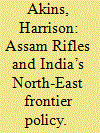

|
|
|
|
|
| Summary/Abstract |
The Assam Rifles, the oldest paramilitary group in India, was formed as a defensive force to protect tea estates from tribal raiding. Following independence, the Indian government reversed British policy in the North-East frontier to extend administrative control over tribal areas that were largely neglected under colonial rule. In aid of this policy change, the government shifted the role of the Assam Rifles to an offensive counterinsurgency force. Based on primary sources, this analysis helps to demonstrate how post-colonial states co-opt colonial institutions to reflect new policies and the use of coercive force by paramilitary groups in the state-making process.
|
|
|
|
|
|
|
|
|
|
|
|
|
|
|
|
| 2 |
ID:
191118
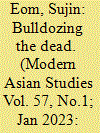

|
|
|
|
|
| Summary/Abstract |
This article looks at lawsuits surrounding two Chinese cemeteries in the mid-twentieth century South Korean cities of Incheon and Seoul as crucial sites to examine the post-colonial legal construction of national citizenry based on property rights. While different legal rationales were employed in each case, the two Chinese cemeteries were relocated to the periphery of each city as a consequence of the litigation. In Incheon, it was argued that the cemetery was owned by Chinese nationals whose land rights were ambiguous and hence open to question, both during the colonial and post-colonial period. On the other hand, in Seoul, rights to the cemetery were at stake due to its association with Japanese nationals, whose holdings were regarded as ‘enemy properties’ in the post-colonial years. Not only were the lawsuits symbolic events that foreshadowed the displacement of Chinese residents from what was considered to be Korea's national land, they also revealed an operative ambiguity in the post-colonial legal system, readily exploited as a tool for discrimination. Drawing upon an analysis of these cases, I argue that the Chinese cemeteries served as a reminder that uncertainty and ambiguity were on tap in the legal workings of post-colonial society, manifested in blunt efforts to define its legitimate members and dictate who is entitled to be buried within a nation's borders.
|
|
|
|
|
|
|
|
|
|
|
|
|
|
|
|
| 3 |
ID:
090416
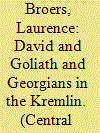

|
|
|
|
|
| Publication |
2009.
|
| Summary/Abstract |
This article presents a post-colonial perspective on post-Soviet conflict in Georgia. Patterns of group classification and incorporation in the tsarist and Soviet eras are charted, to argue that Soviet Georgia was incorporated as a series of layered peripheries, differentiated not only by ethnic affiliation with titular groups, but also by the mode of incorporation into the wider political unit of which they formed part. This produced contrasting articulations of the link between language, identity and power among Georgians, Abkhazians and Ossetians, mediating conflicting reactions to the prospect of post-Soviet devolution. Finally, the nature of the post-Soviet sovereignty attained by Georgia, Abkhazia and South Ossetia is considered.
|
|
|
|
|
|
|
|
|
|
|
|
|
|
|
|
| 4 |
ID:
142831
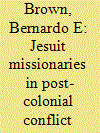

|
|
|
|
|
| Summary/Abstract |
In August 1990, Father Eugene John Hebert SJ disappeared while trying to reach his home in the Sri Lankan city of Batticaloa. Caught in the midst of the turmoil that confronted Tamil and Muslim minorities after the peace-keeping operations led by the Indian armed forces collapsed, Father Hebert was one of thousands of victims who perished in the violence that engulfed the Eastern Province of Sri Lanka between June and September 1990. Since the early stages of the ethnic conflict (1983–2009), American Jesuits stationed in Tamil-speaking areas of the island had become de facto human rights activists, being virtually the only remaining trusted mediators between the different factions involved in the armed confrontation. Their efforts to foster peace and dialogue in the region were far from their original assignment as educators—which Father Hebert had been conducting since his arrival in 1948. This article not only traces Father Hebert's life trajectory from Louisiana to Sri Lanka, it also reflects on the cultural impact that the presence of American Jesuits had in the entire region, as well as on the changing responsibilities they assumed in the volatile political context of the island that took them from coaching basketball to becoming catalysts for peace.
|
|
|
|
|
|
|
|
|
|
|
|
|
|
|
|
| 5 |
ID:
181674
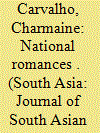

|
|
|
|
|
| Summary/Abstract |
Both the novel’s contribution to the imagining of nations and the role romance plays in this project have been well established. The emergence of chick lit, which tracks the fortunes of a single, young, urban protagonist in post-liberalisation India, offers a lens through which to view the intersection of the neo-liberal economy, nationalism and gender. This study examines two chick lit novels by popular author Anuja Chauhan, showing how they layer romantic union with a fantasy of India that embraces diversity, underpinned by a woman who is able to resolve various dichotomies.
|
|
|
|
|
|
|
|
|
|
|
|
|
|
|
|
| 6 |
ID:
086727
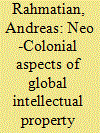

|
|
|
|
|
| Publication |
2009.
|
| Summary/Abstract |
An essential instrument in the process of neo-colonialism by economic means is the establishment of a legal framework of international trade that confers legally enforceable rights that support and safeguard economic penetration and control. This includes, in a similar way as in colonial times, the guarantee of protection of foreign property rights in dependent regions. Today, intellectual property rights fulfil this colonizing role to a large extent. It will be shown that the implementation of the Agreement on Trade-Related Aspects of Intellectual Property Rights is one major device that drives such an economic neo-colonialism forward. This is reflected in the history of the making of this treaty, as well as in the methods of enforcement of intellectual property rights, which will be demonstrated in the example of China. Besides this international expansion of Western-style intellectual property rights, there is another, seemingly contrasting and alternative non-proprietarian, legislative project, which nevertheless has neo-colonial effects: the protection of traditional cultural expressions in the context of "traditional" arts. The article discusses that, despite presumably good intentions, this measure reflects colonial features, such as the concept of indirect rule, and invites segregationist legislation.
|
|
|
|
|
|
|
|
|
|
|
|
|
|
|
|
| 7 |
ID:
095255
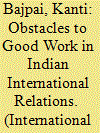

|
|
|
|
|
| Publication |
2009.
|
| Summary/Abstract |
This article suggests that, from 1947 to the late 1980s, Indian International Relations (IIR) led the developing world and certainly Asian IR. Since then, China, Korea and Japan seem to have taken the lead. The article defines the nature of 'good work' as 'good published work' and argues that there are five key obstacles to better published work in IIR: the neglect of theory; the failure to define a series of animating puzzles, problematiques and problem-solving agendas; the lack of methodological training; the quality of teaching; and the mismanagement of professional life. Three reasons are advanced for the origins and persistence of these obstacles: post-colonial parochialism; the influence of the formative moment of the field in India; and the relationship of Political Science/IR to the Indian state. The article concludes that the remedies are primarily in the hands of Indian scholars and not with the government
|
|
|
|
|
|
|
|
|
|
|
|
|
|
|
|
| 8 |
ID:
159790
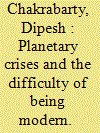

|
|
|
|
|
| Summary/Abstract |
This article questions whether the presently dominant ideas about globalisation and global warming work with very different conceptions of the ‘globe’ that are both connected and yet opposed to each other. The discussion on globalisation may be seen as an extension of homocentric narratives of modernity that see humans as separate from the natural world. The global warming literature, on the other hand, has led to a serious renewal of critical calls to abandon the nature/culture distinction. This article tracks some of the ethical difficulties of being modern at a time when collective human aspirations carry planetary implications. In the process, the article brings into conversation some post-human and post-colonial perspectives on our time.
|
|
|
|
|
|
|
|
|
|
|
|
|
|
|
|
| 9 |
ID:
133557
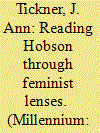

|
|
|
|
|
| Publication |
2014.
|
| Summary/Abstract |
In this article, I suggest ways in which feminist analysis would further enrich Hobson's text. Questioning Hobson's assumption that it is possible to create separate 'metanarratives' about Eurocentrism and patriarchy, I claim that patriarchy, imperialism and Eurocentrism were co-constituted through the practices of Western imperialism and the creation of modern Western knowledge. I then take up Hobson's question that asks whether one is, or is not, Eurocentric is a more important question than whether or not one is a positivist. I argue that both these questions are important and interrelated. Whereas positivism aspires to tell one universal story, post-positivism acknowledges that all theories are constructed in the interest of someone. Therefore it offers us the opportunity to be reflective about our epistemological standpoints - whether or not they are Eurocentric. I then describe some methodological sensitivities concerning these issues that IR feminists have brought to their research. I conclude by reviewing some feminist post-colonial literature that reflects these sensitivities, thereby offering us some tools to overcome the Eurocentric trap.
|
|
|
|
|
|
|
|
|
|
|
|
|
|
|
|
| 10 |
ID:
127897
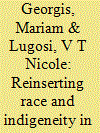

|
|
|
|
|
| Publication |
2014.
|
| Summary/Abstract |
The common narrative of how International Relations (IR) has evolved is based on a chronological linear view of continual progress. This story divides the history of the discipline into phases punctuated by the three Great Debates. However, the analytical categories of race and indigeneity have been missing from all these debates; these erasures in the stories of IR are made possible through a series of ontological and epistemological manoeuvres. These in turn, structure a 'common sense' of what the boundaries of IR are, or what they should be. This is evident in the exclusion of what can be seen as major international security issues, which are largely ignored by the discipline. This paper employs an IR post-colonial perspective, using the example of sex trafficking in Canada and the US to demonstrate how the field of IR remains silent on its colonial legacy, with the wider aim of thinking about the implications that omission has for the discipline.
|
|
|
|
|
|
|
|
|
|
|
|
|
|
|
|
| 11 |
ID:
160971
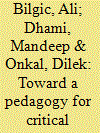

|
|
|
|
|
| Summary/Abstract |
International relations has increasingly paid attention to critical pedagogy. Feminist, postcolonial, and poststructuralist international relations scholarship, in particular, have long been advancing discussions about how to create a pluralist and democratic classroom where “the others” of politics can be heard by the students, who then can critically reflect upon complex power relations in global politics. Despite its normative position, critical security studies has so far refrained from joining this pedagogical conversation. International relations scholars in critical security studies can contribute to the production of a critical political subject in the “uncomfortable classroom,” one who reflects on violent practices of security. Three pedagogical methods will be discussed here: engaging with the students’ lifeworlds, revealing the positionality of security knowledge claims, and opening up the classroom to the choices about how student agency can be performed beyond the classroom. The argument is illustrated with reference to international relations and politics students’ perceptions of Syrian refugees in Turkey. The article advances the discussion in critical international relations pedagogy and encourages critical security studies scholarship to focus on teaching in accordance with its normative position.
|
|
|
|
|
|
|
|
|
|
|
|
|
|
|
|
|
|
|
|
|